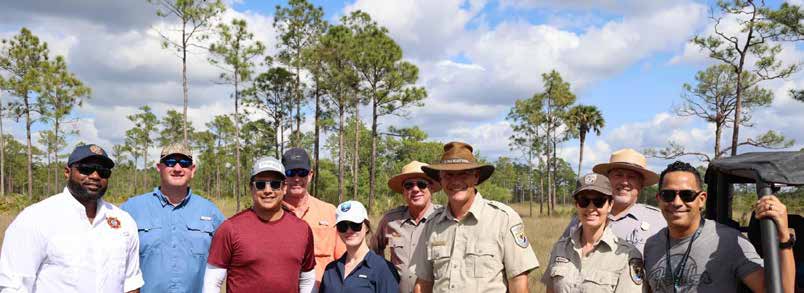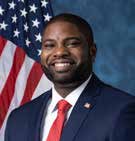from the desk of Representative Byron Donalds
PRESERVING AND PROACTIVELY PROTECTING OUR EVERGLADES

Rep. Donalds (R-FL) joins representatives from the National Park Service, the U.S. Fish and Wildlife Service, the Department of the Interior, and the Miccosukee Tribal Government on a tour of Florida Panther National Wildlife Refuge.
Everglades National Park is one of the most treasured parts of our local community, our state, and our country. Not only is the Everglades the third largest national park in the lower forty-eight states, but it is a World Heritage Site that is home to thirteen endangered species, the largest designated wilderness in the Eastern United States, the largest continuous sawgrass
prairie in North America, the largest mangrove system in our hemisphere, and one of the most significant avian breeding grounds in North America. We are blessed to live so close to such a dynamic and important wildlife reserve, but as its neighbors, we must be active and engaged stewards of this land. To do so, there are various measures that we can take.
This year, we have received little to no rain in Southwest Florida. Consequently, our region is now once again under drought and fire warnings. If wilderness in the Everglades is unmanaged and unkept, catastrophic wildfires could occur, spreading rapidly across the park’s 1.5 million acres of trees, brush, grass, and plant-life. This is why the wildfire-mitigation strategy of prescribed fire is so crucial to our region. For many, the thought of our government purposely burning hundreds of thousands of acres of the Everglades each year is not only horrifying, but scares local homeowners, who worry that the fires may reach their own neighborhoods.
Prescribed fires are conducted by trained professionals who strategically create breaks in the wilderness, to section-off these managed burn sites from other parts of the Everglades and from
our local communities. Prescribed fires help reduce the threat of uncontrollable wildfires, are essential in restoring and maintaining the fire adapted ecosystem of the Everglades, are safer for our first responders, and according to the National Park Service, they are 100 times more cost effective to contain. This practice is not only financially and ecologically smart, but it is a very important, proactive step taken to advance the safety of us all in South Florida.
Other key issues currently affecting the Everglades include invasive species reduction, endangered and threatened species conservation, and water quality. The Florida Panther, American Crocodile, American Alligator and West Indian Manatee are four of the most well-known inhabitants of the Everglades, but each of their species is either endangered or threatened. While it is crucial that we ensure the stability and sustainability of these species,
invasive species such as the Lionfish and Burmese Python have wreaked havoc on this ecosystem.
Originating from the Indo-Pacific, the Lionfish competes directly with native predators like the snapper and grouper, can cause harmful ecological impacts and can cause algae to overgrow
coral reefs if their numbers go unchecked. Also originating from Southeast Asia, the Burmese Python has become a significant problem in the Everglades. The fifteen-to-twenty-foot snake is most likely the main reason that mammal populations in the Everglades have declined sharply over the years. They target squirrels and other smaller creatures, but have even attacked neighboring animals as large as alligators and panthers. Thanks to our National Park Service
rangers, and others on the ground, we have a persistent team of men and women working hard to rein in this growing problem in our region. We must ensure that these men and women are granted the ability to operate machinery on this protected land, to ensure that they can properly do their jobs.
Pristine water quality is also vital to a healthy Everglades. Every day, nutrient-filled water flows into Lake Okeechobee and is subsequently discharged throughout East, West and South
Florida–ultimately resulting in poor water quality and the outbreak of harmful algal blooms. In Congress, I introduced a commonsense bipartisan measure that will turn unused government waste into environmental restoration by addressing various water quality challenges, such as harmful algal blooms, sea-level rise, acidification, pollution, erosion, hydraulic alterations, etc. I have also introduced practical legislation for the inclusion of ‘algal blooms’ to the applicability of Major Disaster Declarations.
Recently, I joined members of my office along with representatives from the National Park Service, the U.S. Fish and Wildlife Service, the Department of the Interior, and the
Miccosukee Tribal Government on a tour of Florida Panther National Wildlife Refuge in the Western Everglades. Together, we thoroughly examined each of these considerable challenges facing the Western Everglades. It is evident that there is still much to be done to preserve and proactively protect the Everglades, but I am confident that together, our combined efforts will be effective.
CONTACT MY OFFICE
Collier County Office
3299 Tamiami Trail East, Suite 105, Naples, FL 34112
Phone: 239.252.6225
Washington, DC Office
1719 Longworth House Office Building, Washington, DC 20515
Phone: 202.225.2536




Leave a Reply
Want to join the discussion?Feel free to contribute!